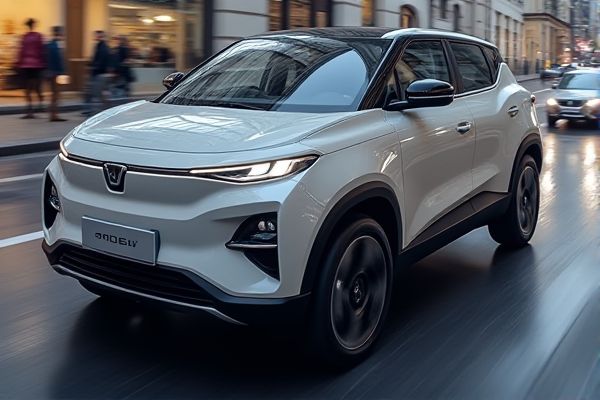
Tata Motors is a prominent EV car brand in India, leading the market with models like the Tata Nexon EV and Tata Tigor EV. These electric vehicles focus on sustainable mobility while offering features that cater to Indian consumers. Charging infrastructure in India is growing, with companies like Ather Energy providing solutions to support EV adoption. Government policies are also promoting electric vehicle usage through incentives and subsidies, encouraging more buyers to switch to eco-friendly options.
Brands to consider
Tata Motors
Tata Motors has made significant strides in the Indian EV market with models like the Tata Nexon EV and Tata Tigor EV, showcasing their commitment to sustainable mobility. The brand focuses on local manufacturing, contributing to India's "Make in India" initiative while ensuring affordability in the electric vehicle segment. Tata Motors emphasizes safety, reinforced by high safety ratings for its EVs, making them a trustworthy option for consumers. With an expanding charging infrastructure and diverse product offerings, Tata Motors aims to enhance the electric vehicle experience for Indian drivers.
Mahindra Electric
Mahindra Electric is a prominent player in India's electric vehicle (EV) market, known for its commitment to sustainable transportation. The brand offers a range of affordable and efficient electric models, such as the Mahindra eVerito and the Mahindra eKUV100, catering to diverse consumer needs. With a focus on local manufacturing and advanced battery technology, Mahindra Electric enhances the accessibility of EVs. The company's extensive charging infrastructure and partnerships further bolster the practicality of transitioning to electric mobility in India.
MG Motor
MG Motor has established itself as a prominent electric vehicle brand in India, emphasizing sustainability and advanced technology. The MG ZS EV offers impressive range and fast charging capabilities, catering to the needs of urban commuters. With features like MG's i-SMART connectivity and a robust safety rating, it aligns with modern consumer expectations. Furthermore, MG Motor's commitment to service and customer satisfaction enhances its appeal in the competitive Indian EV market.
Hyundai
Hyundai offers a diverse range of electric vehicles (EVs) in India, showcasing advanced technology and efficient performance. The brand is recognized for its commitment to sustainability, aligning with global trends toward eco-friendly transportation. Models like the Hyundai Kona Electric and Ioniq 5 feature impressive battery life and cutting-edge safety features, enhancing the driving experience. With a growing network of charging stations, Hyundai supports the convenience needed for urban commuting, making it a practical choice for electric mobility in India. Your decision to consider Hyundai can reflect an investment in innovation and environmental responsibility.
Audi
Audi offers a range of electric vehicles (EVs) that merge luxury with sustainability, appealing to environmentally conscious consumers in India. The brand features advanced technology, including Audi's Quattro all-wheel-drive system, which enhances performance and handling in various terrains. With several EV models like the Audi e-tron and Q4 e-tron, buyers can choose from SUVs and sedans that combine efficiency and style. Audi's commitment to reducing carbon emissions aligns with India's growing focus on eco-friendly transportation solutions.
Sustainability Focus
Sustainability in electric vehicles (EVs) is increasingly important for brands in India like Tata Motors, which emphasizes eco-friendly manufacturing processes and renewable energy usage. Your choice of an EV can contribute to reduced greenhouse gas emissions, aligning with India's commitment to combat climate change. Many EVs incorporate recyclable materials and energy-efficient technologies to minimize their environmental impact. The growing infrastructure for electric charging stations across major cities further supports the shift towards sustainable transportation in India.
Government Incentives
Government incentives for EV car brands in India include various subsidies and financial benefits aimed at promoting electric vehicle adoption. The Faster Adoption and Manufacturing of Hybrid and Electric Vehicles (FAME) scheme provides monetary support and tax rebates for manufacturers and buyers. States like Delhi and Maharashtra offer additional benefits such as registration fee waivers and cash incentives. As an EV car owner, your decision can be influenced by these incentives, ultimately reducing the overall cost of ownership.
Battery Technology
Battery technology plays a vital role in the performance and efficiency of electric vehicles (EVs) in India. Brands like Tata Motors are investing heavily in advanced lithium-ion batteries, which provide higher energy density and longer life cycles. The growth of charging infrastructure complements these advancements, making it easier for users to charge their EVs. Research into solid-state batteries is underway, which promises better safety and faster charging times. Your choice of EV will increasingly depend on these technological improvements in battery performance.
Charging Infrastructure
The charging infrastructure for electric vehicles (EVs) in India is expanding rapidly, with various brands, including Tata Motors, investing heavily in establishing charging stations. As per the Ministry of Heavy Industries, over 4,000 public charging points have been installed across urban areas to facilitate EV adoption. Companies like Ather Energy are developing fast-charging networks, enabling quicker charging times for users. Collaborations between government and private entities aim to enhance accessibility and promote the use of EVs in cities across India. With increasing awareness and initiatives, your access to charging stations is set to improve, making EV ownership more convenient.
Range and Efficiency
Range and efficiency are significant factors for electric vehicle (EV) brands in India like Tata Motors. Tata's Nexon EV offers an impressive range of around 312 kilometers on a single charge, making it suitable for urban commuting. The efficiency of EVs can be measured in terms of energy consumption, with many models averaging about 6 kilometers per kilowatt-hour, enhancing cost-effectiveness. Your decision on which EV to purchase can be influenced by these performance metrics to suit your driving needs.
 indiabrand.org
indiabrand.org